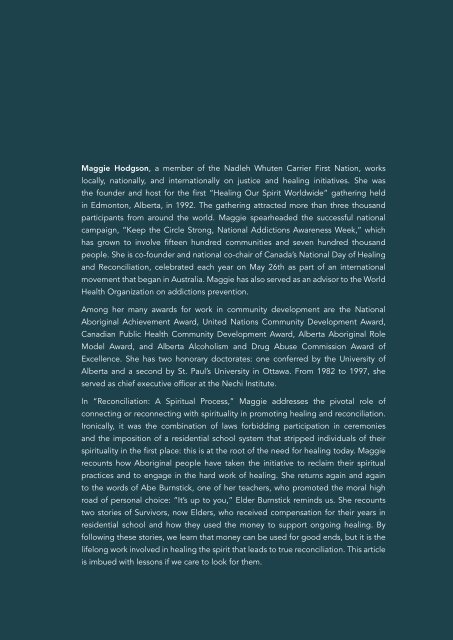Maggie Hodgson - Speaking My Truth
Maggie Hodgson - Speaking My Truth
Maggie Hodgson - Speaking My Truth
You also want an ePaper? Increase the reach of your titles
YUMPU automatically turns print PDFs into web optimized ePapers that Google loves.
<strong>Maggie</strong> <strong>Hodgson</strong>, a member of the Nadleh Whuten Carrier First Nation, works<br />
locally, nationally, and internationally on justice and healing initiatives. She was<br />
the founder and host for the first “Healing Our Spirit Worldwide” gathering held<br />
in Edmonton, Alberta, in 1992. The gathering attracted more than three thousand<br />
participants from around the world. <strong>Maggie</strong> spearheaded the successful national<br />
campaign, “Keep the Circle Strong, National Addictions Awareness Week,” which<br />
has grown to involve fifteen hundred communities and seven hundred thousand<br />
people. She is co-founder and national co-chair of Canada’s National Day of Healing<br />
and Reconciliation, celebrated each year on May 26th as part of an international<br />
movement that began in Australia. <strong>Maggie</strong> has also served as an advisor to the World<br />
Health Organization on addictions prevention.<br />
Among her many awards for work in community development are the National<br />
Aboriginal Achievement Award, United Nations Community Development Award,<br />
Canadian Public Health Community Development Award, Alberta Aboriginal Role<br />
Model Award, and Alberta Alcoholism and Drug Abuse Commission Award of<br />
Excellence. She has two honorary doctorates: one conferred by the University of<br />
Alberta and a second by St. Paul’s University in Ottawa. From 1982 to 1997, she<br />
served as chief executive officer at the Nechi Institute.<br />
In “Reconciliation: A Spiritual Process,” <strong>Maggie</strong> addresses the pivotal role of<br />
connecting or reconnecting with spirituality in promoting healing and reconciliation.<br />
Ironically, it was the combination of laws forbidding participation in ceremonies<br />
and the imposition of a residential school system that stripped individuals of their<br />
spirituality in the first place: this is at the root of the need for healing today. <strong>Maggie</strong><br />
recounts how Aboriginal people have taken the initiative to reclaim their spiritual<br />
practices and to engage in the hard work of healing. She returns again and again<br />
to the words of Abe Burnstick, one of her teachers, who promoted the moral high<br />
road of personal choice: “It’s up to you,” Elder Burnstick reminds us. She recounts<br />
two stories of Survivors, now Elders, who received compensation for their years in<br />
residential school and how they used the money to support ongoing healing. By<br />
following these stories, we learn that money can be used for good ends, but it is the<br />
lifelong work involved in healing the spirit that leads to true reconciliation. This article<br />
is imbued with lessons if we care to look for them.<br />
360 360 | |

















